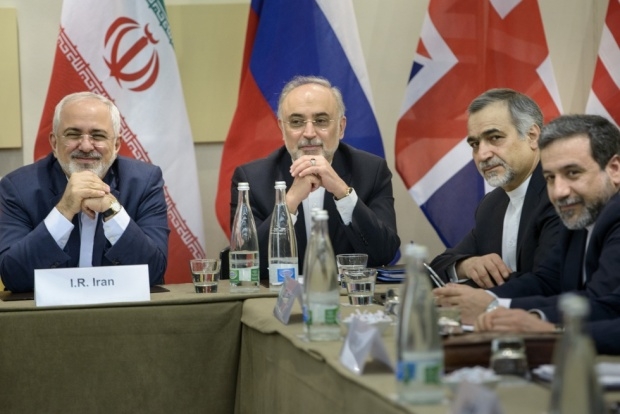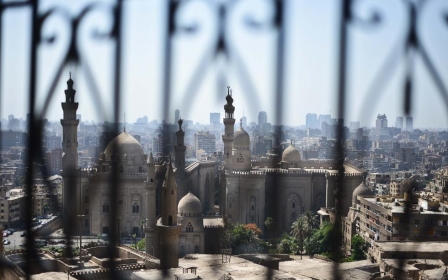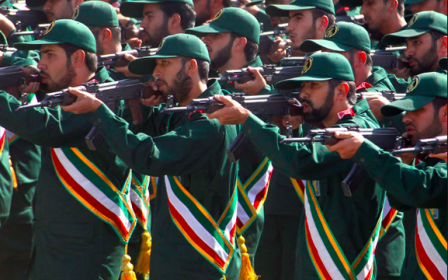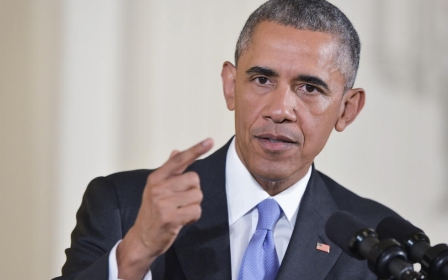ANALYSIS: Iranian hardliners trying to kill nuclear pact

On 15 July, Iran’s Foreign Minister Mohammad Javad Zarif left Vienna, where the nuclear talks with P5+1 governments were held. For Tehran the outcome was a great achievement: a nuclear deal.
Nuclear talks have always been a controversial issue in Iran. Hardliners have accused Iranian negotiators of accepting excessive demands and giving in to pressure, while reformists and moderates have supported them, describing Zarif’s negotiating team as skilful and courageous.
Following the nuclear deal’s successful end, Iranian President Hassan Rouhani wrote a letter to the Supreme Leader Ayatollah Ali Khamenei, congratulating him for the Vienna agreement, and thanking him for his "smart instruction" and "continuous support". In response to the president, Ayatollah Khamenei praised him and his negotiators for their efforts, describing the concluding talks as an important step in Iran’s future.
On the same day that deal was announced, Rouhani gave a speech, warning hardliners about possible attempts to "ruin people's hopes through lies and false accusations". But his warning was not heeded. UN security council resolutions and a few articles within the agreement, such as the continuation of the international arms embargo on Iran, became the new target for Rouhani’s opponents in their attempt to slam the nuclear deal.
Iran's state TV, which is managed independently and has political views that are more akin to hardliners, was among the first to seriously criticise and question the Vienna deal and its resolution.
In a synchronised move, state TV ran a report on its three most popular channels, claiming the deal has significant errors, including the arms embargo article. But this wasn’t the end of their critique. In the days following the nuclear deal, state TV invited foreign policy experts to question the deal as well. Meanwhile, Iran’s Deputy Foreign Minister Abbas Araghchi appeared on Channel 2 and was grilled by the anchor, though he managed to articulately answer all the questions.
Araghchi, in response to a question on the article of the resolution that asks Tehran not to work on a specific type of ballistic missile, said, "Parts of the UN Security Council resolution are non-binding" and "if the deal - the Joint Comprehensive Plan Of Action - is breached, the resolution will be broken as well; however, the other way around does not hold true."
The day following Araghchi's appearance on state TV, the supreme leader's adviser on international affairs Ali Akbar Velayati was invited to the same programme and faced similar questions. The anchor's sentiments of doubt were so evident to the point that Velayati told him: “Whatever I say about the deal won’t convince you … I don’t want to argue with you."
He then expressed his support for the negotiating team saying, "I testify that Iran's negotiators did whatever they could."
Sadegh Zibakalam, a professor at the University of Tehran, lambasted Iran's TV programmes when he said to a local news site, "Iran's state TV is heavily biased, and unfortunately it follows the political views of hardliners closely and those who have close contact with Ahmadinejad [Iran's former president]".
Nonetheless, Hossein Shariatmadari, the chief editor of the hardline newspaper Kayhan wrote an op-ed, arguing: "A quick review of the text of the Vienna agreement shows clearly that some red lines have been ignored."
Moreover, Nine Days weekly, owned by a hardline MP Hamid Rasaie, described the deal as "worse than bad". Attacks by hardliners were so overwhelming that an article published on the supreme leader's website asked critics not to brand the negotiators as "traitors".
On 21 July, Iran’s foreign minister along with the head of the Atomic Energy Organisation of Iran, Ali Akbar Salehi, went to the parliament to submit the full text of the deal. During the session, Zarif attempted to explain the vague parts of the deal, answering many questions that were brought up by Parliamentary Speaker Ali Larijani and other MPs. While Zarif was elaborating on the deal’s details, some of the hardliners posed as if they were sleeping.
Nonetheless, Zarif managed to obtain the endorsement of many MPs. Darush Qanbari, a former MP, told Middle East Eye: "Members of parliament are satisfied with the foreign minister’s report, they know that the nuclear deal is in the interests of the people, that is why they are content with the Vienna agreement."
Moreover, Rohollah Hosseinian, an MP and one of the most staunch critics of the nuclear talks, objected to the parliament's presidium for "trying to make people not to hear voices of dissent," but admitted "we are the minority (when it comes to the nuclear deal issue)".
Meanwhile, many conservatives have tried to distance themselves from hardliners. Gholam Ali Haddad Adel, an influential MP heading the "principlists" faction in parliament and a clear opponent of Rouhani's policies, has said nothing in favour or against the deal.
Moreover, some of the most influential Friday prayer leaders in Iran have not only approved the deal, but they supported the negotiating team. "The deal is owed to the guidance of the supreme leader who constantly monitored nuclear talks and showed the right path to the negotiating team with his warnings," said Ayatollah Mohammad Ali Movahedi Kermani in a sermon to worshippers at weekly Friday prayers on 16 July in the Iranian capital, Tehran.
He then added: "The Zionist regime (Israeli) and Saudi Arabia are angry about the nuclear deal, and this is the best proof of the value of the deal."
Iranian Revolutionary Guard Corps (IRGC) generals and other military commanders have also avoided criticising the deal, but some of them have only expressed concerns about a few articles of the UN Security Council resolution. Besides, Basij Commander General Naghdi has said, "IRGC and the government stand united on the nuclear deal."
It should be noted that, as IRNA reported, the majority of the Grand Ayatollahs of Iran have also commended the nuclear deal. Grand Ayatollah Hossein Vahid Khorasani said: "The efforts of our negotiators were artistic and committed."
Hence, Iran's high-ranking officials and religious figures have accepted and endorsed the nuclear deal, and parliament is paying no attention to the minority opposition. Now, the number of opponents of the nuclear deal has narrowed, and the hardliners are left alone and concerned about the consequences of the nuclear deal and its impact on parliamentary elections. It is noteworthy that the election is due to be held on 25 February 2016.
"When hardliners were in power, lots of resolutions were passed by the UN Security Council against Iran, and now they don’t like to see the success of a moderate government, because they are concerned about the victory of moderate candidates and those who have close views to President Rouhani in the coming parliamentary election," Qanbari said.
Currently, it seems like hardliners won't be able to hurt the nuclear deal unless the US Congress rejects the agreement. If it does reject the Vienna agreement, Iran's parliament - which decides on the deal a few days after US Congress votes - is likely to retaliate.
Abdollah Shahbazi, a political analyst and historian, told Iran’s Tolou Weekly: "Iran's parliament will pass the deal; in fact we have fewer problems in Iran than in the US."
He went on to say: "Iran’s parliament is simply waiting to see what the US Congress will do to reciprocate."
New MEE newsletter: Jerusalem Dispatch
Sign up to get the latest insights and analysis on Israel-Palestine, alongside Turkey Unpacked and other MEE newsletters
Middle East Eye delivers independent and unrivalled coverage and analysis of the Middle East, North Africa and beyond. To learn more about republishing this content and the associated fees, please fill out this form. More about MEE can be found here.




